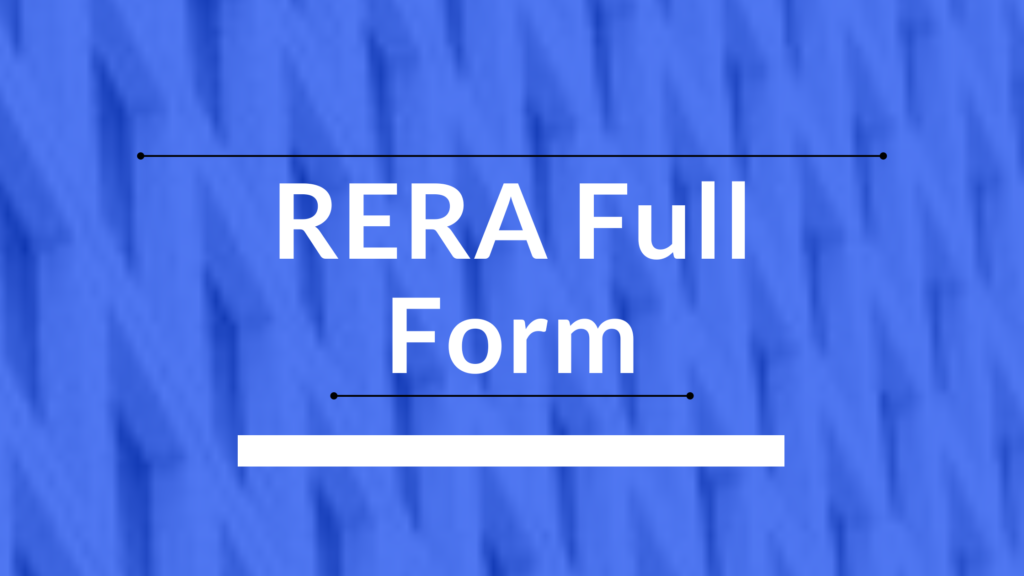Discover the full form of RERA and how this game-changing law has transformed the Indian real estate market by ensuring transparency, protecting homebuyers, and regulating developers. Learn about its benefits, compliance, and future impact.

Introduction to RERA
- What is RERA?
- Importance of RERA in the Indian Real Estate Sector
What is the Full Form of RERA?
- Definition and Meaning of RERA
- Why is it called RERA?
History of RERA
- Why was RERA Introduced?
- The Real Estate Scenario Before RERA
Key Objectives of RERA
- Ensuring Transparency in Real Estate Transactions
- Protection of Buyers’ Interests
Main Features of RERA
- Registration of Projects and Agents
- Standardization of Sale Agreements
- Accountability in Project Deadlines
How Does RERA Work?
- Registration Process for Developers
- Role of Real Estate Agents
- RERA’s Adjudicating Authority
Benefits of RERA for Homebuyers
- Timely Delivery of Projects
- Reduced Risk of Fraudulent Transactions
- Transparency in Pricing
RERA Compliance for Developers
- Importance of Obtaining RERA Approval
- Penalties for Non-Compliance
How to Check a Project’s RERA Status
- Step-by-Step Guide to Verifying RERA Registration Online
- Importance of Checking the RERA Status Before Buying
Impact of RERA on the Real Estate Market
- Influence on Property Prices
- Role in Regulating the Market
Challenges Faced by RERA
- Delays in Implementing Rules in Some States
- Challenges for Small Developers
RERA and Real Estate Agents
- How RERA Affects Real Estate Brokers
- Role of RERA in Regulating Agents
Penalties and Disputes Under RERA
- Dispute Resolution Mechanism
- Penalties for Defaulting Developers
The Future of RERA in India
- How RERA Can Evolve Further
- Expectations from the Real Estate Industry
Conclusion
- Summarizing the Role of RERA in Real Estate
- Future Prospects for Buyers and Developers
FAQs
RERA Full Form: Understanding the Real Estate Regulatory Authority
Introduction to RERA
The real estate sector in India has long been known for its complexities, lack of transparency, and unregulated practices. However, with the introduction of RERA (Real Estate Regulatory Authority), the landscape of property transactions has seen a transformative shift. But what exactly is RERA, and how does it impact homebuyers and developers alike?
What is RERA?
RERA, which stands for Real Estate Regulatory Authority, is a landmark regulation introduced by the Indian government to overhaul the real estate sector. Enacted through the Real Estate (Regulation and Development) Act in 2016, RERA aims to bring transparency and accountability to the housing market. It serves as a governing body responsible for regulating real estate transactions, ensuring that both buyers and developers adhere to fair practices. Essentially, RERA is designed to create a structured environment where real estate dealings are transparent and equitable.
Importance of RERA in the Indian Real Estate Sector
RERA has been a game-changer for the Indian real estate sector, which previously faced numerous challenges such as delayed project completions, opaque pricing, and unreliable developers. Here’s why RERA is so crucial:
- Enhanced Transparency: By mandating that developers disclose comprehensive project details, including timelines, costs, and legal approvals, RERA ensures that buyers have access to clear and honest information before making a purchase.
- Consumer Protection: One of RERA’s primary objectives is to safeguard the interests of homebuyers. It provides a legal recourse for buyers in case of delays or discrepancies, ensuring that developers are held accountable.
- Regulated Market Practices: RERA standardizes practices across the industry, from the registration of projects to the format of sale agreements. This regulation helps reduce instances of fraud and misrepresentation.
- Faster Dispute Resolution: The Act establishes a dedicated adjudicatory mechanism to resolve disputes between buyers and developers quickly and fairly, providing an efficient way to address grievances.
Overall, RERA’s implementation marks a significant shift towards a more organized and trustworthy real estate market in India, benefitting both consumers and developers by fostering a fair and reliable property transaction environment.
What is the Full Form of RERA?
Definition and Meaning of RERA
The full form of RERA is Real Estate Regulatory Authority. It represents a regulatory framework established by the Indian government to oversee and govern the real estate sector. RERA is a body designed to enforce the Real Estate (Regulation and Development) Act, 2016, which aims to bring about transparency, accountability, and efficiency in the real estate market.
Definition: RERA is a regulatory authority set up to monitor and regulate real estate transactions, ensuring that developers adhere to fair practices and that buyers are protected from fraudulent activities. It enforces rules that mandate clear disclosures, timely project completions, and standardized practices in the real estate industry.
Meaning: RERA’s core purpose is to enhance consumer confidence in the real estate sector by establishing a legal framework that enforces fair play. It seeks to address long-standing issues such as delayed project completions, hidden costs, and the lack of standardization in real estate transactions.
Why is it called RERA?
The term Real Estate Regulatory Authority accurately reflects the body’s functions and responsibilities:
- Real Estate: This signifies the sector RERA is concerned with—property development, sales, and transactions.
- Regulatory: This highlights RERA’s role in overseeing and enforcing regulations within the real estate sector to ensure compliance and fairness.
- Authority: This term denotes RERA’s power to implement rules, mediate disputes, and impose penalties on those who fail to adhere to the prescribed norms.
In essence, the name RERA captures the essence of its role as a governing authority responsible for regulating and improving the real estate industry, thereby ensuring a more transparent and consumer-friendly market.
History of RERA
The need for a regulatory body in the real estate sector arose from the lack of accountability and transparency. Before RERA, many homebuyers faced challenges like project delays, false promises, and unclear pricing structures. To address these concerns, the Real Estate (Regulation and Development) Act was enacted in 2016, making RERA operational in 2017. The act brought about a paradigm shift in how real estate transactions were carried out in India.
Key Objectives of RERA
The objectives of RERA are aimed at cleaning up the real estate sector and bringing fairness to the dealings between buyers and developers. Some of the main goals include:
- Ensuring Transparency in Real Estate Transactions: RERA mandates that developers disclose project details, including timelines, layouts, and approvals, ensuring transparency.
- Protection of Buyers’ Interests: One of RERA’s core functions is to protect buyers from fraudulent practices by developers.
Main Features of RERA
RERA brings many new standards and rules to ensure that the real estate market becomes a more regulated and reliable space for all parties involved. Key features include:
- Registration of Projects and Agents: Every real estate project (above a certain size) and real estate agent must register with RERA before engaging in sales.
- Standardization of Sale Agreements: All agreements between buyers and sellers must follow a standardized format, reducing the risk of misleading terms.
- Accountability in Project Deadlines: Developers are now bound to adhere to promised deadlines, and failure to do so attracts penalties.
How Does RERA Work?
RERA’s primary function is to ensure that all real estate transactions follow a standardized set of rules:
- Registration Process for Developers: Developers must register their projects under RERA and provide detailed information, including financial statements, land title status, and progress updates.
- Role of Real Estate Agents: Agents are also regulated under RERA and must register themselves to engage in real estate transactions.
- RERA’s Adjudicating Authority: RERA has the authority to resolve disputes between buyers and developers, ensuring quick and fair resolutions.
Benefits of RERA for Homebuyers
RERA offers numerous advantages for homebuyers:
- Timely Delivery of Projects: With clear timelines, developers are accountable for delays, providing relief to buyers who face endless waiting periods.
- Reduced Risk of Fraudulent Transactions: Buyers can verify a project’s credentials via RERA’s online portal, ensuring that they are dealing with authorized developers.
- Transparency in Pricing: RERA ensures that developers disclose the actual cost of the property, including any additional charges.
RERA Compliance for Developers
For developers, compliance with RERA is not just a requirement but a necessity:
- Importance of Obtaining RERA Approval: Projects that do not comply with RERA are not legally allowed to advertise or sell, making it crucial for developers to seek approval.
- Penalties for Non-Compliance: Developers who do not follow RERA’s regulations face heavy penalties, including monetary fines and even imprisonment in severe cases.
How to Check a Project’s RERA Status
Checking a project’s RERA status is straightforward and ensures you are making an informed decision:
- Visit the RERA website of your state.
- Enter the project details.
- Verify if the project is registered and check all related documents.
By doing so, buyers can safeguard themselves from fraudulent developers.
Impact of RERA on the Real Estate Market
RERA has had a significant impact on the real estate market:
- Influence on Property Prices: While it has added some regulatory costs, RERA has ensured that the pricing of properties is more transparent.
- Role in Regulating the Market: With clear rules and penalties, the real estate market is now more regulated, boosting buyer confidence.
Challenges Faced by RERA
Despite its positive impact, RERA has faced some challenges:
- Delays in Implementing Rules in Some States: Not all states have implemented RERA’s rules uniformly, leading to inconsistencies.
- Challenges for Small Developers: Smaller developers sometimes find it difficult to comply with the stringent requirements, affecting their business operations.
RERA and Real Estate Agents
RERA also impacts real estate brokers:
- How RERA Affects Real Estate Brokers: Brokers must register under RERA, ensuring that only certified agents are part of real estate transactions.
- Role of RERA in Regulating Agents: RERA holds brokers accountable for their actions, ensuring that they deal fairly with buyers and sellers.
Penalties and Disputes Under RERA
RERA offers a robust mechanism for dispute resolution:
- Dispute Resolution Mechanism: Buyers can approach the RERA authority if a developer does not meet contractual obligations.
- Penalties for Defaulting Developers: Developers who violate RERA norms face significant penalties, including refunds to buyers.
The Future of RERA in India
RERA is expected to evolve further in the coming years:
- How RERA Can Evolve Further: The future may see RERA expand to cover more aspects of real estate, including commercial properties.
- Expectations from the Real Estate Industry: As RERA grows, developers and buyers alike expect more stringent enforcement of rules.
Conclusion
RERA has brought about a much-needed change in India’s real estate sector, ensuring transparency, accountability, and fairness. It protects buyers and holds developers responsible for delivering on their promises. With further improvements, RERA is poised to create an even more robust and secure environment for real estate transactions in India.
FAQs
1. What is the Full Form of RERA?
RERA stands for Real Estate Regulatory Authority.
2. How Can I Check if a Property is RERA Registered?
You can verify the registration by visiting the RERA website of your respective state and entering the project details.
3. Are All Real Estate Agents Required to Register Under RERA?
Yes, all agents involved in property sales must register under RERA.
4. What Happens if a Developer Doesn’t Follow RERA Guidelines?
Developers can face fines, project suspension, and even legal action.
5. Is RERA Applicable to Commercial Properties?
Initially, RERA focused on residential properties, but it can also apply to commercial projects.


2 thoughts on “RERA Full Form: Unlocking the Game-Changing Law That Transforms Indian Real Estate Forever”